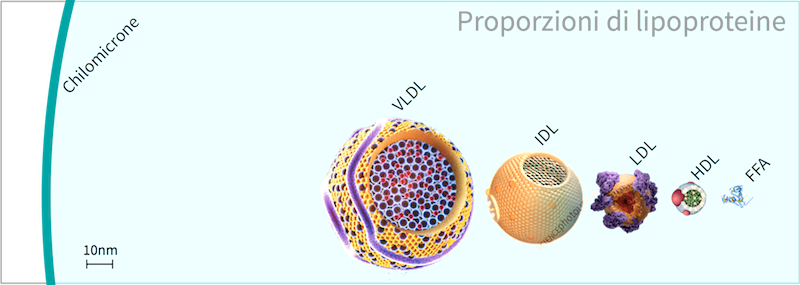Address:
20 Park Plaza, Suite 804
Boston, MA 02116
978-888-7999
Address:
20 Park Plaza, Suite 804
Boston, MA 02116
978-888-7999

The “good” HDL hypothesis came from the Framingham heart study. It would be the second from smallest particle in the picture above. It identified Low Density Lipoprotein as a risk for heart disease. The citizens of Framingham smoked, drank, consumed diets high in ultra- processed foods and trans fats, and rarely exercised resulting in a significant incidence of heart disease. There were only a few people with high elevated levels of High Density Lipoprotein, but they clearly had a lower risk of heart disease. Why they had high levels was a mystery.
High-density lipoprotein (HDL) cholesterol is often considered the “good” cholesterol, because it is associated with a lower risk of cardiovascular diseases. However, extremely high levels of HDL cholesterol may also pose certain risks. While elevated HDL levels are beneficial, there are also downsides to very high HDL cholesterol.
One potential risk of extremely high levels of HDL cholesterol is a condition known as dysfunctional HDL. Very high levels of HDL may contain dysfunctional particles that do not remove cholesterol from cells as does healthy HDL. Cholesterol accumulates in blood vessels, leading to the formation of plaques and increasing the risk of atherosclerosis.
Excessively high HDL levels (>80) may be indicative of health conditions or genetic factors that could pose another health risk, such as dementia.
Under the heading of “unintended consequences,” while LDL cholesterol is often referred to as “bad” cholesterol, it plays a crucial role in transporting cholesterol to cells. Extremely low levels of LDL cholesterol impair this process and impact overall lipid metabolism.
The evidence that high HDL cholesterol ( ≥60 mg/dL) increases the risk of vascular diseases was first published in 2000. The strong belief in a “good” cholesterol was challenged by a group of Australian cardiologists (who analyzed data from a study on hormone replacement therapy for cardiac risk unrelated to HRT). High HDL-C occurred in 20% of women with coronary heart disease even when other coronary heart disease risk factors were not present.
The Centers for Disease Control does a very large survey of 5000 people called the National Health Assessment of Nutrition and Exercise Survey. Buried in the NHANES data from 1999 are cases of women over the age of sixty with an HDL over 60 with a one in six chance of having a heart attack before they were seventy. This represented a four times greater risk than women with HDL below 60. The two findings did not alter the belief in “good” cholesterol.
In 2023 , other physicians in Australia analyzed dementia data from 18,600 patients from the US and Australia. All patients had laboratory exams and cognitive testing and were in good health at the outset of the study. Over six years of observation 850 (4.6%) cases of incident dementia were recorded. Participants with high HDL-C (>80 mg/dL) had a 27% higher risk of dementia.
The risks of HDL follow a U-shaped curve. There’s a high incidence of heart disease with HDL below 40, the “sweet spot” with the lowest incidence of heart disease occurs between 40 and 60, and somewhere north of 60-80 the risk increases for men as well as women.
In conclusion, while high levels of HDL cholesterol are beneficial for cardiovascular health, very high levels may pose certain risks, including dysfunctional HDL particles, imbalances in lipid profiles, and potential associations with underlying health conditions. Further research is needed to fully elucidate the implications of extremely high HDL levels and guide appropriate clinical recommendations. As with any health-related matter, individuals should consult with healthcare professionals to assess their specific risk factors and develop personalized strategies for maintaining optimal lipid levels.Top of Form
There is no specific medicine to lower HDL, In consultation with your physician, you can modify your diet. Plant- based diets decrease the number of inflammatory lipoproteins and the fiber absorbs the cholesterol particles and carries them out of the body. You should also avoid ultra- processed foods, which are highly inflammatory.
